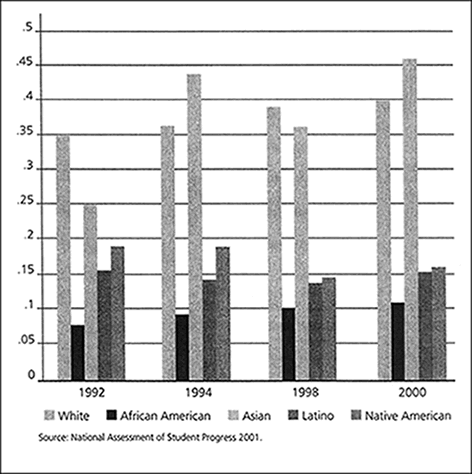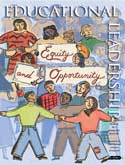Education policymakers continually talk about the causes of the achievement gap between minority and nonminority students. Why haven't we asked African American students what they consider to be the reasons for their low performance on national achievement assessments?
Some would say that we have asked students many times about their academic performance. What we really mean, though, is that we have lectured students about the importance of school. When we ask them why they're not trying harder, it's a rhetorical question; we're not really ready to listen to their answers.
Perhaps we have not asked the right questions in the right way. As a researcher, I wanted to engage African American students in powerful conversations around this issue, getting beyond the typical responses that educators have heard again and again: “School is boring” or “The work is too hard.” Over a three-day period, I talked with 300 students enrolled in all grade levels at a north Philadelphia high school.
Asking the Right Questions
Each group of about 50 students entered the assembly room laughing and talking with their peers. I began each session by saying, “I want to challenge you.” I told them I wanted to hear from them what they thought about the causes of poor academic performance. They responded by settling down and displaying courteous behavior and serious interest.
To create a mind-set for the presentation, I told the students that I was certain they had never been asked to discuss the causes of poor academic performance, and I wanted to hear what they were thinking. Using a set of instructions adapted from a life-coaching seminar, I explained,I want you to think more deeply than you have ever thought before, to speak more clearly than you have ever spoken before, and to write more creatively than you have ever written before. (Ellis, 2000)
Thinking more clearly than they had ever thought before meant that rather than talking off the top of their heads, they should think outside the box, think before talking, and think about what they felt deep inside but may not have expressed before.
Speaking more clearly than they had ever spoken before did not refer to grammar or use of slang. Rather, they needed to express their ideas clearly and in detail. They would have to give me the words; I could not guess what they wanted to say.
Writing creatively did not refer to spelling or sentence structure. Instead, I wanted them to give themselves time to let their imaginations flow and then write about their thoughts.
Next, I projected on a screen some reading achievement scores of five ethnic populations of 4th grade students taken from the 2000 National Assessment of Student Progress (2001), as shown in figure 1. As the scores for each ethnic group appeared, the students made comments and sometimes laughed uneasily. I explained that laughter could be a camouflage for feeling uncomfortable and that laughter was all right as long as they understood their real feelings. Their embarrassment was apparent as the bars revealed that African American students scored lower than all other groups over an eight-year period.
Figure 1. Proficiency Scores of 4th Grade Students, by Ethnic Group

The students were finally ready to receive the question that now appeared on the screen: African American 4th grade children score much lower than other ethnic groups. What do you think is the number one reason African American children do not score as high as other ethnic groups?
I asked the students to write their answer on an index card and then share their written comments with the group.
What Students Said
Five categories of student responses emerged as significant: 31 percent of the responses indicated that students held themselves responsible for their lack of achievement; 24 percent referred to teacher behaviors; 18 percent discussed the parents' role; 13 percent discussed schools; and 11 percent referred to the student's environment or community. The remaining comments fell into such categories as school boards, funding, and society.
Poverty, a category that I had expected to emerge as significant, was cited by only 7 students and was not discussed as an inhibitor of student achievement, even though research has confirmed its impact (Darling-Hammond, 2000). The students did not perceive themselves as “poor,” although they did discuss their need to “hustle” to get the things they wanted.
Students on Students
Since we were born with boundaries set against us, some just choose to go along with the stereotype that we are less and that we don't count for anything. Some don't have the mind-set to achieve and some just need motivation and guidance to help them. (10th grade student)
Many students said that they lacked motivation and simply didn't apply themselves. They wrote about their lack of focus and admitted that they could do better if they studied more and tried harder. They also cited peer pressure, saying that their need to belong to their peer group was stronger than their desire to achieve academically. They pointed out that a student can be viewed by his or her peers as “cool” and smart but be identified by school personnel as disruptive and failing.
Some students said that they were embarrassed to ask teachers for help, especially in front of their peers, so they pretended that they were doing the work or they acted out. Their inability to do assigned tasks made them feel frustrated and angry.
Teachers
We don't get much support from teachers. They just hand out the work and expect us to do it and learn without doing much teaching. (11th grade student)
Although the students did not think that teachers were the only reason for their lack of achievement, they did identify teachers as a significant part of the problem. Students across all grade levels said that teachers were not teaching the “right thing” and did not make learning fun or interesting. Students complained that teachers often did not explain the work well and ran through the material quickly without seeming to care whether students understood. Many teachers handed out work without providing an introduction, checking for prior knowledge, or making sure that students were clear about expectations.
Some students also felt that they were doing virtually the same work in high school that they had done in elementary school; this level of work reinforced their belief that teachers didn't care about preparing them well for the future. Students asserted that some teachers did not know their subject matter well, a claim that the literature on the subject supports (Darling-Hammond, 2000).
Parents
It really starts at home. The parents don't get involved with what their kids are doing, like their homework and seeing about them in school. (9th grade student)
Many students wrote that parents held low expectations for their children. Some students said that their parents did not ask them about homework, help them with their work, or even ask to see their grades. They felt that they did not have anyone to talk to about things that happened in their lives, and this sense of isolation affected their schoolwork tremendously.
Students wanted their parents to spend more time with them. They talked about how much their parents loved them, but they believed that the love did not get translated into positive action. Students wanted their parents to discipline them more. Some stated that their parents let them do whatever they wanted to do instead of setting clear limits. Many students complained about parents not attending parent-teacher conferences or talking with their teachers.
Schools
Want to keep up with everyone else? Forget about school, just look like everyone else and act like everyone else. (11th grade student)
Many students responded that school was a “joke.” They did not see the need to pursue a high school diploma because they believed that it could not provide them with a job that would pay enough. Students reported that they attended school not to receive an education but to meet their friends and to hang out.
Some students also admitted that they did not take state and national achievement tests seriously; they were told that these tests would not affect their report card grades, so they just filled in the blanks and handed the tests back in. During group discussions, one student stated that she had no idea that standardized test results affected how the rest of the world viewed her and her peers intellectually. Other students echoed this statement. They had never before seen the 4th grade National Assessment of Educational Progress results for reading—or any other study showing how their achievement compared with that of other ethnic groups. They clearly felt angry about this lack of awareness, and they believed that such knowledge would have motivated them to try harder.
Environment
I think we score low because of our environment and our background. For example, I have lived around criminals and drug dealers my whole life. And that is what I think my life is all about. (9th grade student)
Although this statement was unusually strong, it captured the hopelessness expressed by many students concerning their environment. Some students viewed their environment as a trap. When they considered trying to improve their performance, they feared being labeled as “acting white.” Their environment sent them the message that white students are achievers, and African American students are “cool” but not achievers.
Students freely admitted that their minds were on the streets instead of on their books. Some were fascinated with the prospect of making large sums of money in a short time; unlike school, the streets offered them an opportunity to gain respect. These students, however, were outnumbered 10 to 1 by students who said that the streets were a bad influence and held no future for them.
Taking Action
We are not numbers that anyone should add up. That's why young people get discouraged over racism and world issues and so they have that mind-set that they can't achieve [and] they believe it. Well, I am not going to let it go on! (11th grade student)
Students grasped the problem of African American underachievement clearly. Although the perspectives of the students in this study are limited to their own life experiences, their comments provide insights that can guide our efforts to improve the academic achievement of all students. The following recommendations are based on the survey results.
- Hold a comprehensive session each year to provide students with detailed information about their achievement data, and include comparable data by ethnicity and region. Students have a right to know how their academic performance is viewed locally and nationally. They also should know how their present performance affects their chances for a successful future.
- Shift the major emphasis of in-service workshops for educators away from content enrichment and new reform initiatives. Focus instead on helping educators gain an understanding of how people learn, including human growth, child development, and the importance of culture.
- Provide parent institutes funded by grants to share student data and to tell parents what they can do to ensure their children's academic success. If we know that parent involvement is pivotal to student achievement, why not provide stipends to parents to attend informative inservice opportunities? The stipends would also assist parents with their food, housing, clothing, and child-care needs.
- Because the church has always been a place of learning and political activity for African Americans, contact all church leaders in a community and ask them to designate a particular day to discussing—in worship services, sermons, and meetings—the achievement scores of students and ways to support student success.
In Turning to One Another, Margaret J. Wheatley writes, “There is no power for change greater than a community discovering what it cares about.”
As educators, we say that we care about students. Does this mean some students, or all students? If we mean all students, then these recommendations provide a starting point.

